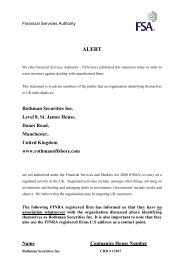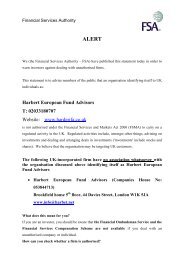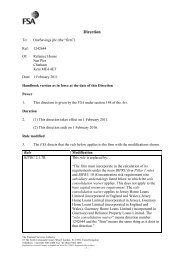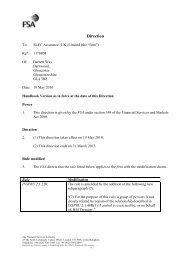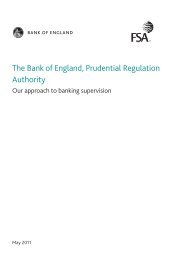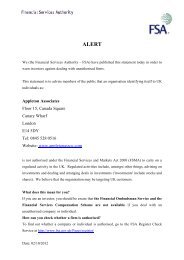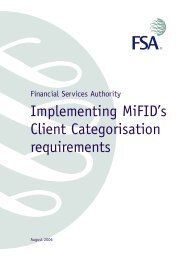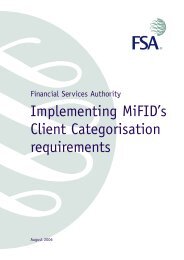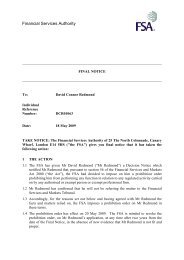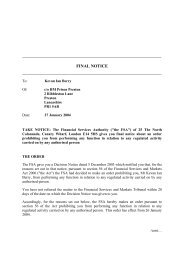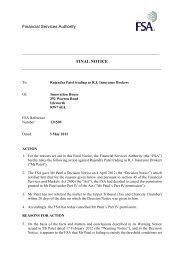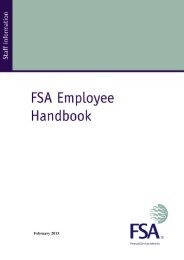Final notice for Ravi Shankar Sinha - Financial Services Authority
Final notice for Ravi Shankar Sinha - Financial Services Authority
Final notice for Ravi Shankar Sinha - Financial Services Authority
You also want an ePaper? Increase the reach of your titles
YUMPU automatically turns print PDFs into web optimized ePapers that Google loves.
<strong>Financial</strong> <strong>Services</strong> <strong>Authority</strong><br />
To: <strong>Ravi</strong> <strong>Shankar</strong> <strong>Sinha</strong><br />
FSA<br />
Reference<br />
Number: RSS01040<br />
Dated: 31 January 2012<br />
FINAL NOTICE<br />
TAKE NOTICE: The <strong>Financial</strong> <strong>Services</strong> <strong>Authority</strong> of 25 The North Colonnade, Canary<br />
Wharf, London E14 5HS (“the FSA”) gives you a final <strong>notice</strong> that it has taken the<br />
following action:<br />
1. ACTION<br />
1.1. For the reasons given in this <strong>notice</strong>, the FSA hereby:<br />
(1) makes an order, with effect from the above date and pursuant to section 56 of<br />
the <strong>Financial</strong> <strong>Services</strong> and Markets Act 2000 (“the Act”), prohibiting <strong>Ravi</strong><br />
<strong>Shankar</strong> <strong>Sinha</strong> (“Mr <strong>Sinha</strong>”) from per<strong>for</strong>ming any function in relation to any
egulated activity carried on by any authorised or exempt person or exempt<br />
professional firm on the grounds that he is not a fit and proper person; and<br />
(2) imposes a financial penalty of £2.867 million on Mr <strong>Sinha</strong>, pursuant to section<br />
66 of the Act on the grounds that he has failed to act with integrity in breach of<br />
Statement of Principle 1.<br />
1.2. The financial penalty consists of the following elements:<br />
(1) a disgorgement of financial benefit arising from Mr <strong>Sinha</strong>’s misconduct of<br />
£1.367 million; and<br />
(2) an additional penalty element of £1.5 million.<br />
2. REASONS FOR THE ACTION<br />
Summary of the conduct in issue<br />
2.1. Between 16 May 2005 and 11 November 2009, Mr <strong>Sinha</strong> was the Chief Executive<br />
Officer of JC Flowers & Co UK Limited (“JCFUK”). He was also a Managing<br />
Director of JC Flowers & Co LLC (“JCFUS”), a US based private equity firm.<br />
Together, JCFUK and JCFUS are referred to as “JCF”.<br />
2.2. JCFUK is an investment adviser to JCFUS, itself an investment adviser to private<br />
equity funds (the “JCF Funds”), recommending potential investments in Europe to<br />
JCFUS, as well as monitoring those investments, advising JCFUS on them and,<br />
where appropriate, advising the management of the companies that the JCF Funds<br />
invested in.<br />
2.3. Between 17 February and 26 October 2009, Mr <strong>Sinha</strong> fraudulently obtained<br />
€1,548,396.67 (amounting to £1.367 million on the basis set out at paragraph 6.16(1)<br />
below) <strong>for</strong> himself from a company in which the JCF Funds had invested (“Company<br />
A”) without the knowledge or involvement of anyone else within JCF. He did this<br />
by issuing invoices to Company A <strong>for</strong> fees, payable to himself, to which Mr <strong>Sinha</strong><br />
knew that he was not entitled. In order to secure payment of the invoices, Mr <strong>Sinha</strong><br />
deliberately misled the CEO of Company A by claiming that the payments had been<br />
authorised and approved by JCF when in fact no such authorisation or approval had<br />
been sought or given. In addition, Mr <strong>Sinha</strong> dishonestly concealed from JCF the fact<br />
that he had received the payments from Company A.<br />
2.4. Mr <strong>Sinha</strong> engaged in this dishonest behaviour in order to obtain additional income to<br />
meet his pressing financial obligations.<br />
2.5. The FSA considers that Mr <strong>Sinha</strong> failed to act with honesty and integrity in carrying<br />
out his controlled function of chief executive (CF 3), contrary to Statement of<br />
Principle 1.<br />
2.6. The FSA regards Mr <strong>Sinha</strong>’s behaviour as very serious because:<br />
(1) Mr <strong>Sinha</strong> abused his position as CEO of JCFUK;<br />
(2) he engaged in a dishonest, deliberate and sustained course of misconduct<br />
which lasted <strong>for</strong> several months;<br />
2
(3) he obtained significant sums <strong>for</strong> his personal benefit as a result of his<br />
misconduct; and<br />
(4) he held positions of trust in relation to JCFUK and JCFUS, the JCF Funds and<br />
their investors, and Company A and by his actions abused the trust that those<br />
persons and firms gave him.<br />
2.7. The FSA there<strong>for</strong>e considers that Mr <strong>Sinha</strong>’s conduct merits the imposition of a<br />
prohibition order, a substantial financial penalty and disgorgement of his financial<br />
benefit.<br />
3. RELEVANT STATUTORY AND REGULATORY PROVISIONS<br />
3.1. The FSA has the power, pursuant to section 56 of the Act, to prohibit an individual<br />
from per<strong>for</strong>ming any function in relation to any regulated activity where it appears to<br />
the FSA that that individual is not a fit and proper person.<br />
3.2. The purpose of the part of the FSA Handbook entitled Fit and Proper Test <strong>for</strong><br />
Approved Persons (“FIT”) is to outline the main criteria <strong>for</strong> assessing the fitness and<br />
propriety of a candidate <strong>for</strong> a controlled function. In this instance, the criteria set out<br />
in FIT are relevant in considering whether the FSA will exercise its powers to make a<br />
prohibition order in respect of an individual in accordance with the EG 9.9. FIT<br />
1.3.1G provides that the FSA will have regard to a number of factors when assessing<br />
the fitness and propriety of a person, including the person’s honesty and integrity.<br />
3.3. The FSA has the power, pursuant to section 66 of the Act, to impose a financial<br />
penalty on a person of such amount as it considers appropriate where it appears to the<br />
FSA that he is guilty of misconduct and it is satisfied that it is appropriate in all the<br />
circumstances to take action against him.<br />
3.4. A person is guilty of misconduct if, while an approved person, he, among other<br />
things, fails to comply with a Statement of Principle issued under section 64 of the<br />
Act.<br />
3.5. The Statements of Principle are set out in that part of the FSA’s Handbook known as<br />
the Statements of Principle and Code of Practice <strong>for</strong> Approved Persons (“APER”).<br />
The Statements of Principles themselves are set out at APER 2.1.2P. Statement of<br />
Principle 1 states that:<br />
“An approved person must act with integrity in carrying out his controlled<br />
function.”<br />
3.6. APER 3.1 (Introduction) gives guidance on the Code of Practice <strong>for</strong> Approved<br />
Persons. APER 3.1.4G(1) states:<br />
“An approved person will only be in breach of a Statement of Principle where<br />
he is personally culpable. Personal culpability arises where an approved<br />
person's conduct was deliberate or where the approved person's standard of<br />
conduct was below that which would be reasonable in all the circumstances<br />
(see DEPP 6.2.4 G (Action against approved persons under section 66 of the<br />
Act )).”<br />
3
3.7. Although not an exhaustive list, APER 4.1 (Statement of Principle 1) provides<br />
specific examples of behaviour or conduct which may contravene Statement of<br />
Principle 1. In particular, APER 4.1.2E provides that APER 4.1.3E – 4.1.13E<br />
describe examples of conduct which, in the opinion of the FSA, do not comply with<br />
Statement of Principle 1.<br />
3.8. APER 4.1.3E states:<br />
“Deliberately misleading (or attempting to mislead) by act or omission:<br />
(1) a client; or<br />
(2) his firm (or its auditors or an actuary appointed by his firm under SUP<br />
4 (Actuaries)); or<br />
(3) the FSA;<br />
falls within APER 4.1.2E.”<br />
3.9. The relevant provision of APER 4.1.4E states:<br />
“Behaviour of the type referred to in APER 4.1.3 E includes, but is not limited<br />
to, deliberately:<br />
(1) falsifying documents;<br />
…<br />
(9) providing false or inaccurate documentation or in<strong>for</strong>mation, …;”<br />
3.10. APER 4.1.10E states:<br />
“Deliberately misusing the assets or confidential in<strong>for</strong>mation of a client or of<br />
his firm falls within APER 4.1.2E.”<br />
3.11. The relevant provisions of APER 4.1.11E state:<br />
“Behaviour of the type referred to in APER 4.1.10 E includes, but is not<br />
limited to, deliberately:<br />
…<br />
(3) misappropriating a client's assets, including wrongly transferring to<br />
personal accounts cash or securities belonging to clients; …”<br />
4. FACTS AND MATTERS RELIED ON<br />
Background<br />
4.1. JCF is a private equity group, which was founded in the United States of America in<br />
2000. JCF consists of two companies, JCFUS and JCFUK. JCFUS acts as fund<br />
manager <strong>for</strong> private equity funds which focus on financial services investments, the<br />
JCF Funds. In 2005, JCFUK was established to act as an investment adviser to<br />
JCFUS. Under the terms of the agreement between JCFUK and JCFUS, JCFUK’s<br />
role was to provide sub-advisory services in connection with investments made by<br />
the JCF Funds in Europe. These services included identifying investments (all within<br />
4
Europe), advising with respect to the monitoring of those investments, analysing the<br />
per<strong>for</strong>mance of the same and reporting thereon to JCFUS and, where appropriate,<br />
providing advice to the management of the companies in the investment portfolio.<br />
Under the agreement, JCFUS was treated as a professional client as defined by the<br />
FSA’s rules.<br />
4.2. Mr <strong>Sinha</strong> was a Managing Director at JCF, he was the most senior person within the<br />
European arm of JCF’s business and he was the CEO of JCFUK. As CEO of<br />
JCFUK, his specific duties included ensuring that JCFUK appropriately fulfilled and<br />
discharged its role as investment adviser to JCFUS and he had primary responsibility<br />
<strong>for</strong> ensuring that JCFUK complied with FSA rules and requirements. As Managing<br />
Director of JCFUS, his role was to source investment opportunities in Europe<br />
(excluding the UK) and elsewhere.<br />
4.3. Whilst at JCFUK, Mr <strong>Sinha</strong> held the following Controlled Functions:<br />
CONTROLLED FUNCTION START DATE END DATE<br />
CF1 Director 16/05/2005 11/11/2009<br />
CF3 Chief Executive 16/05/2005 11/11/2009<br />
CF8 Apportionment and Oversight 16/05/2005 31/03/2009<br />
CF10 Compliance Oversight 16/05/2005 11/11/2009<br />
CF11 Money Laundering Reporting 16/05/2005 11/11/2009<br />
CF13 Finance 16/05/2005 13/10/2007<br />
CF23 Corporate Finance Adviser 16/05/2005 31/10/2007<br />
CF28 Systems and Controls 01/11/2007 11/11/2009<br />
CF30 Customer 01/11/2007 11/11/2009<br />
4.4. Mr <strong>Sinha</strong> also invested his own capital in companies which the JCF Funds had<br />
invested in. In part the purpose of this appears to have been <strong>for</strong> him to demonstrate a<br />
personal commitment to the investments that were being made by the JCF Funds.<br />
4.5. Mr <strong>Sinha</strong> borrowed large sums of money to make his personal investments. Between<br />
May - July 2008, Mr <strong>Sinha</strong> borrowed nearly €9 million <strong>for</strong> investment purposes.<br />
4.6. From 2007 onwards, the financial crisis greatly affected the investments of the JCF<br />
Funds. Mr <strong>Sinha</strong>’s own financial position deteriorated because it was closely tied to<br />
the per<strong>for</strong>mance of the JCF Funds and their underlying investments. The decline in<br />
JCF Funds’ per<strong>for</strong>mance also affected Mr <strong>Sinha</strong>’s cash flow. As the value of his<br />
investments declined and the income he received from his investments dried up, he<br />
had difficulty servicing his loans and meeting his financial obligations.<br />
Invoicing Scheme<br />
4.7. In order to address his pressing financial obligations and cash flow problems,<br />
including an overdue payment on a bank loan, Mr <strong>Sinha</strong> decided to abuse his position<br />
as CEO to procure payments from Company A (a European company in which the<br />
JCF Funds were invested) to which he knew he was not entitled.<br />
4.8. In January 2009, Mr <strong>Sinha</strong> approached the CEO of Company A, whom he had had<br />
previous business dealings with, in order to obtain a loan of €248,396.67 (the<br />
“Company A Loan”). Mr <strong>Sinha</strong> lied to the CEO of Company A in that he told him<br />
that JCF had authorised Mr <strong>Sinha</strong> to take out the loan. The Company A Loan was<br />
5
the exact amount of an instalment Mr <strong>Sinha</strong> owed on a bank loan. A loan agreement<br />
was established between Mr <strong>Sinha</strong> and Company A in respect of the Company A<br />
Loan. Mr <strong>Sinha</strong> had not obtained authorisation or approval from, or otherwise<br />
disclosed the Company A Loan to, any person within JCF.<br />
4.9. In April 2009, Mr <strong>Sinha</strong> again approached the CEO of Company A, and in<strong>for</strong>med<br />
him that JCF had authorised Mr <strong>Sinha</strong> to charge advisory fees to Company A. In<br />
fact, Mr <strong>Sinha</strong> had not sought or obtained authorisation or approval from JCF to<br />
charge advisory fees to Company A. Furthermore, no-one within JCF was aware that<br />
Mr <strong>Sinha</strong> intended to invoice Company A <strong>for</strong> advisory fees.<br />
4.10. Subsequent to this Mr <strong>Sinha</strong> obtained three further payments:<br />
(1) €400,000 on 21 May 2009;<br />
(2) €400,000 on 29 June 2009; and<br />
(3) €500,000 on 21 October 2009.<br />
4.11. In respect of each payment, Mr <strong>Sinha</strong> submitted an invoice to Company A <strong>for</strong> fees<br />
payable to directly to him, which purported to set out the advisory services he had<br />
personally provided to Company A. In fact the invoices were fraudulent and Mr<br />
<strong>Sinha</strong> had not provided any advisory services to Company A in his personal capacity.<br />
Work that Mr <strong>Sinha</strong> had per<strong>for</strong>med in relation to Company A included monitoring<br />
the investments made in Company A by the JCF Funds and exploring potential exit<br />
routes from that investment. For this work, Mr <strong>Sinha</strong> was already well remunerated<br />
earning a salary of $800,000 as CEO of JCFUK and $400,000 as Managing Director<br />
of JCFUS. In addition, Mr <strong>Sinha</strong>, as a partner in JCFUS, was also entitled to a share<br />
(known as “carry”) in any gains over a hurdle return that JCFUS made on its<br />
investments, including its investment in Company A.<br />
4.12. Mr <strong>Sinha</strong> also raised a further invoice, again purportedly <strong>for</strong> advisory fees, of<br />
€260,000. This amount was offset against the outstanding balance, including accrued<br />
interest, of the Company A Loan.<br />
4.13. All of the payments referred to above were made to Mr <strong>Sinha</strong>’s personal bank<br />
account from Company A (or from other companies within Company A’s group). In<br />
total, Mr <strong>Sinha</strong> dishonestly obtained €1.548 million in payments from Company A<br />
over the course of 8 months.<br />
4.14. When Mr <strong>Sinha</strong> obtained these payments he was acting without authorisation from<br />
JCF and in breach of his fiduciary duties as a director of JCFUK. Further, he was<br />
aware that he was removing value from Company A and there<strong>for</strong>e acting to the<br />
detriment of Company A and the JCF Funds’ investors (which included JCFUS). JCF<br />
has since compensated Company A; there<strong>for</strong>e the JCF Funds’ investors and<br />
Company A did not ultimately suffer any loss as a result of Mr <strong>Sinha</strong>’s actions.<br />
4.15. Mr <strong>Sinha</strong>’s conduct was discovered by JCFUK on 26 October 2009 and was notified<br />
promptly to the FSA. He was suspended and his employment was subsequently<br />
terminated by JCFUK with effect from 11 November 2009. The FSA makes no<br />
criticism of JCFUK’s systems and controls in connection with the payments obtained<br />
by Mr <strong>Sinha</strong> from Company A which are attributable to Mr <strong>Sinha</strong> acting dishonestly<br />
6
and without integrity and by his deliberate breach of the terms of his service<br />
arrangement with JCFUK and JCF’s Code of Ethics.<br />
5. REPRESENTATIONS FINDINGS AND CONCLUSIONS<br />
Representations<br />
5.1. Mr <strong>Sinha</strong> made written and oral representations. Mr <strong>Sinha</strong> accepted that he had<br />
engaged in the misconduct described in this <strong>notice</strong> and thus his representations<br />
focussed upon matters relevant to the appropriate sanction. In particular Mr <strong>Sinha</strong><br />
addressed issues which went to the level of the financial penalty to be imposed upon<br />
him.<br />
The extent of Mr <strong>Sinha</strong>’s admissions<br />
5.2. Mr <strong>Sinha</strong> contended that when determining the appropriate financial penalty the FSA<br />
should take account of his admissions concerning his misconduct. He submitted that<br />
it was wrong to allege that he had not admitted his failings. He argued that he had in<br />
fact admitted to his wrong doing from a very early stage and that he had not<br />
subsequently sought to go back on this admission. Instead he stated that the FSA had<br />
misconstrued comments he had made when he had sought to explain his actions.<br />
5.3. Mr <strong>Sinha</strong> also submitted that had he sought authorisation it would have been<br />
<strong>for</strong>thcoming from JCF. He there<strong>for</strong>e contended that his conduct was not as serious as<br />
it might otherwise have been and he argued that his early admissions about his<br />
misconduct should be viewed against this backdrop.<br />
The relevance of the damage suffered by Mr <strong>Sinha</strong><br />
5.4. Mr <strong>Sinha</strong> submitted that the FSA should take account of the damage he had suffered<br />
as a result of his misconduct. Mr <strong>Sinha</strong> argued that it was a relevant factor <strong>for</strong> the<br />
FSA to take into account when assessing what financial penalty would be appropriate<br />
in this matter. In particular he argued that the FSA should take this into account<br />
when assessing the extent to which he had derived a benefit and also whether the<br />
penalty should be reduced to take account of the potential <strong>for</strong> a financial penalty to<br />
cause him serious financial hardship.<br />
The benefit derived from his misconduct<br />
5.5. Mr <strong>Sinha</strong> submitted that the FSA should follow the proper meaning of the words<br />
contained within DEPP 6.5.2(G)(6):<br />
“(a) the FSA will propose a penalty which is consistent with the principle that a<br />
person should not benefit from the breach.”<br />
5.6. Mr <strong>Sinha</strong> contended that when calculating any disgorgement figure to be applied to a<br />
financial penalty the FSA should decide, as a matter of fact, whether he had<br />
benefitted from the breach and if so the extent of that benefit. Mr <strong>Sinha</strong> argued that<br />
it was clear that he had not benefitted from his misconduct as the figure of £1.367<br />
millions, which represents the monies he had obtained, was eclipsed by the as yet<br />
unrealised amount that would have accrued to him as his share of the “carry”, which<br />
7
he had <strong>for</strong>feited when his misconduct had come to light. Mr <strong>Sinha</strong> submitted that the<br />
loss of “carry” meant that he had not, as a matter of fact, made any net benefit from<br />
his misconduct. Instead he stated that as a direct consequence of his misconduct he<br />
had suffered a significant loss. Mr <strong>Sinha</strong> there<strong>for</strong>e argued that on a proper<br />
interpretation of DEPP, and ignoring matters that he submitted were irrelevant to this<br />
calculation, the FSA should determine that he had in fact not derived any benefit<br />
from his misconduct and that as a result of the fact that he had suffered loss as a<br />
result of his misconduct there was no amount to be disgorged.<br />
Co-operation with the investigation<br />
5.7. Mr <strong>Sinha</strong> submitted that he had been co-operative throughout the investigation.<br />
Furthermore he submitted that he had admitted to the principle aspects of his<br />
wrongdoing. There<strong>for</strong>e it was argued that notwithstanding the fact that he had<br />
denied certain assertions made about him he should still be given the credit which his<br />
significant degree of co-operation merited.<br />
The appropriate level of financial penalty in the light of precedent cases<br />
5.8. Mr <strong>Sinha</strong> submitted that the punitive element of the financial penalty was too high in<br />
the light of comparator cases. In particular Mr <strong>Sinha</strong> referred to a previous matter,<br />
involving market manipulation, which had been cited as a comparator case. Mr<br />
<strong>Sinha</strong> submitted that there were a number of aggravating factors in that matter which<br />
made it a far more serious case. Principally Mr <strong>Sinha</strong> was concerned that the FSA<br />
should not overlook the importance of the amount of loss caused in the comparator<br />
case compared with the significantly smaller amount of loss he had caused. However<br />
Mr <strong>Sinha</strong> also noted, amongst other things, that in his case the misconduct had only<br />
affected two parties whilst in the comparator case he noted that a large number of<br />
market participants had been affected.<br />
Mr <strong>Sinha</strong>’s current financial position<br />
5.9. Mr <strong>Sinha</strong> explained that he had been discharged from bankruptcy on 23 August<br />
2011. He submitted that notwithstanding the fact that he had been discharged from<br />
bankruptcy the imposition of the financial penalty would cause him serious financial<br />
hardship and in fact it would result in his having to be made bankrupt <strong>for</strong> a second<br />
time.<br />
5.10. Mr <strong>Sinha</strong> stated that though he had been discharged from bankruptcy his estate was<br />
still being administered as there had been some difficulties in realising assets<br />
contained within a trust <strong>for</strong> which he was the beneficiary. He noted that these<br />
unrealised assets could, when realised, amount to a figure greater than that owed to<br />
his creditors. However he suggested that the most likely scenario would see his<br />
creditors paid back a portion of that which he owed them once these assets had been<br />
realised. Mr <strong>Sinha</strong> noted that one of his creditors was JCF who had made a claim <strong>for</strong><br />
the monies he had fraudulently obtained.<br />
5.11. Mr <strong>Sinha</strong> submitted that these issues surrounding his bankruptcy had a few potential<br />
consequences upon any financial penalty. Mr <strong>Sinha</strong> submitted that he was unfairly at<br />
risk of paying back £1.367 million, or a portion thereof, to JCF as well as paying<br />
£1.367 million to the FSA by way of disgorgement. Mr <strong>Sinha</strong> submitted that the<br />
8
FSA should there<strong>for</strong>e not impose the disgorgement element of the financial penalty,<br />
which was calculated by reference to the figure of £1.367 million, to ensure that he<br />
did not pay this figure twice.<br />
5.12. Mr <strong>Sinha</strong> also submitted that though there was the possibility that his estate might<br />
realise more than was owed to his creditors he should nonetheless be treated as<br />
having no assets. He there<strong>for</strong>e submitted that he would suffer serious financial<br />
hardship were the financial penalty to be imposed.<br />
5.13. Mr <strong>Sinha</strong> thus contended that the FSA should take account of the serious financial<br />
hardship which he would suffer and reduce his penalty accordingly. He made this<br />
submission though he acknowledged that the <strong>Financial</strong> <strong>Services</strong> and Markets<br />
Tribunal (as it then was) had stated in the case of Atlantic Law LLP and Andrew<br />
Greystoke v The <strong>Financial</strong> <strong>Services</strong> <strong>Authority</strong> that:<br />
“The fact that the purpose of imposing a financial penalty is not to bring about<br />
insolvency does not mean that the Tribunal cannot and should not fix a penalty<br />
which may have that un<strong>for</strong>tunate result.”<br />
5.14. Mr <strong>Sinha</strong> submitted that this principle should not be applied in his case as his<br />
misconduct was not sufficiently serious to merit the imposition of a financial penalty<br />
which would result in his going bankrupt. Mr <strong>Sinha</strong> compared the seriousness of his<br />
wrongdoing and that seen in the case of David John Bed<strong>for</strong>d v The <strong>Financial</strong><br />
<strong>Services</strong> <strong>Authority</strong>. In addition to drawing parallels between the seriousness of his<br />
and Mr Bed<strong>for</strong>d’s misconduct Mr <strong>Sinha</strong> also highlighted other similarities between<br />
the cases. Having noted the comparability of the two cases Mr <strong>Sinha</strong> then urged the<br />
FSA to adopt the approach taken by the Upper Tribunal in Mr Bed<strong>for</strong>d’s case when it<br />
concluded that:<br />
“…we cannot see any purpose to imposing on a person in Mr Bed<strong>for</strong>d’s<br />
position a penalty he is unable to pay. It is not, we think, an immaterial<br />
consideration that if the imposition of such a penalty should provoke his<br />
bankruptcy, that eventuality would quite possibly cause prejudice to his other<br />
creditors. Accordingly, though we recognise the <strong>for</strong>ce of what was said by the<br />
tribunal in Atlantic Law LLP and Andrew Greystoke, we think that course<br />
should be adopted only in a clear case, which we are not persuaded this is.”<br />
The conduct of the FSA<br />
5.15. Mr <strong>Sinha</strong> complained that the treatment he had received from the FSA had led him to<br />
conclude that the authority had prejudged his case and was determined to punish him<br />
severely <strong>for</strong> his misconduct. In support of this contention he highlighted three<br />
examples of what he considered to be evidence of inappropriate conduct by the FSA.<br />
Mr <strong>Sinha</strong> suggested that two articles which had appeared in national newspapers<br />
about his case included details which would only be known to those close to the case;<br />
he speculated that this in<strong>for</strong>mation could have come from the FSA. He also<br />
complained about the disclosure of elements of his case to JCF in their capacity as a<br />
third party and he complained that the Warning Notice had been sent to him on the<br />
date when he was discharged from bankruptcy.<br />
The personal impact upon Mr <strong>Sinha</strong><br />
9
5.16. Mr <strong>Sinha</strong> stated that he was apologetic <strong>for</strong> his actions and that he understood the<br />
gravity of his misconduct. Additionally he submitted that his misconduct had<br />
resulted in a number of dire consequences <strong>for</strong> him and <strong>for</strong> his family. He explained<br />
that not only had he gone bankrupt but his reputation and career had both been<br />
destroyed. He also stated that he was conscious of, and sorry <strong>for</strong>, the fact that he had<br />
let down all those whose trust he had abused.<br />
Findings<br />
5.17. Notwithstanding Mr <strong>Sinha</strong>’s written and oral representations the FSA finds that it is<br />
appropriate to impose upon him the sanctions set out in paragraph 1.1 of this Notice.<br />
In particular the FSA finds that it is appropriate to impose a financial penalty of<br />
£2.867 million consisting of a disgorgement element totalling £1.367 million and an<br />
additional penalty of £1.5 million.<br />
The extent of Mr <strong>Sinha</strong>’s admissions<br />
5.18. Whilst the FSA acknowledges that Mr <strong>Sinha</strong> had admitted much of the substance of<br />
his misconduct at an early stage the FSA notes that he had continued to dispute<br />
certain issues such as the length of time over which his misconduct had taken place.<br />
There<strong>for</strong>e whilst the FSA takes account of the admissions he made the FSA does not<br />
consider that the extent of his admissions mitigates the seriousness of his misconduct.<br />
5.19. The FSA notes that Mr <strong>Sinha</strong> submitted that had he sought authorisation <strong>for</strong> his<br />
actions from JCF then it would have been granted. The FSA also notes that this is an<br />
assertion which is denied by JCF. The FSA makes no findings on this issue as it<br />
does not consider that this matter is relevant to the level of Mr <strong>Sinha</strong>’s culpability nor<br />
does the FSA consider that this would serve as any <strong>for</strong>m of mitigation were his<br />
assertion to be correct.<br />
The relevance of the damage suffered by Mr <strong>Sinha</strong><br />
5.20. Whilst the FSA has taken into account the impact Mr <strong>Sinha</strong>’s misconduct has had<br />
upon him the FSA does not accept that as a consequence of the damage he has<br />
suffered, the element of the financial penalty comprising the disgorgement figure<br />
should be reduced. The FSA also does not accept that the additional element of the<br />
financial penalty should be reduced because the imposition of this penalty would<br />
probably cause Mr <strong>Sinha</strong>, who is only recently discharged from the bankruptcy<br />
which resulted from his misconduct, to suffer serious financial hardship.<br />
The benefit derived from his misconduct<br />
5.21. The FSA rejects Mr <strong>Sinha</strong>’s submissions about the correct approach to calculating<br />
disgorgement. The FSA finds that the amount of Mr <strong>Sinha</strong>’s benefit, <strong>for</strong> the<br />
purposes of calculating disgorgement, was equal to the £1.367 million which he<br />
fraudulently obtained. The FSA notes that when Mr <strong>Sinha</strong>’s misconduct had come to<br />
light and his employment had been terminated, he had <strong>for</strong>feited his entitlement to his<br />
share of the “carry”. Furthermore the FSA notes that the amount which could have<br />
accrued to him from his entitlement to the “carry” may have significantly exceeded<br />
the £1.367 million which he obtained. However the FSA does not accept that the<br />
“carry” amount should be offset against the £1.367 million which he fraudulently<br />
10
obtained. The FSA considers that where individuals engage in serious misconduct<br />
like Mr <strong>Sinha</strong>, those individuals will, when their wrongdoing is discovered, face the<br />
unpleasant but <strong>for</strong>eseeable consequences of this misconduct, and this will often<br />
include the loss of various benefits associated with their work. The FSA there<strong>for</strong>e<br />
does not consider that it should reduce the amount to be disgorged from Mr <strong>Sinha</strong> in<br />
the absence of any evidence to suggest that he did not actually obtain £1.367 million.<br />
The FSA finds that this approach is consistent with the principle set out in DEPP<br />
6.5.2(G)(6) as it will ensure that Mr <strong>Sinha</strong> will not benefit from his breach.<br />
Co-operation with the investigation<br />
5.22. As is noted above the FSA acknowledges that Mr <strong>Sinha</strong> admitted much of the<br />
substance of his misconduct at an early stage. Furthermore the FSA does not dispute<br />
that Mr <strong>Sinha</strong> has co-operated with the investigation of his misconduct. The FSA has<br />
taken this into account in determining the amount of the financial penalty.<br />
The appropriate level of financial penalty in the light of precedent cases<br />
5.23. The FSA finds that the punitive element of the financial penalty is set at an<br />
appropriate and proportionate amount and there<strong>for</strong>e the FSA rejects Mr <strong>Sinha</strong>’s<br />
submission that it should be reduced as it is inconsistent with the penalties imposed<br />
in previous cases. The FSA notes the various aggravating features which were<br />
present in the case to which Mr <strong>Sinha</strong> referred and which were absent in his case.<br />
The FSA also notes that the conduct in the case to which Mr <strong>Sinha</strong> referred resulted<br />
in a loss, to other market participants, that was approximately 7 times greater than the<br />
loss resulting from Mr <strong>Sinha</strong>’s misconduct. Nonetheless the FSA considers that the<br />
penalty is merited because of Mr <strong>Sinha</strong>’s level of seniority and the leading position<br />
of JCF in the financial services industry. The FSA notes that in the case to which Mr<br />
<strong>Sinha</strong> referred the individual concerned held a less prominent position in the<br />
industry.<br />
Mr <strong>Sinha</strong>’s current financial position<br />
5.24. The FSA notes that Mr <strong>Sinha</strong>’s bankruptcy was only discharged on 23 August 2011.<br />
Moreover the FSA accepts that the imposition of the financial penalty would<br />
probably result in Mr <strong>Sinha</strong> suffering serious financial hardship. Indeed the FSA<br />
accepts that it is probable that the imposition of the financial penalty would have the<br />
un<strong>for</strong>tunate result of him once again being made bankrupt. However the FSA<br />
considers that the seriousness of his misconduct means that it should not reduce the<br />
punitive element of the financial penalty notwithstanding the impact that this will<br />
probably have on Mr <strong>Sinha</strong>.<br />
5.25. The FSA agrees that whilst it would not ordinarily reduce the disgorgement element<br />
of a financial penalty, and in this case the imposition of that portion of the financial<br />
penalty will still cause him serious financial hardship, it is still open to the FSA to<br />
reduce the punitive element of the financial penalty where it would result in serious<br />
financial hardship. The FSA also notes that the tribunal decided in the case of David<br />
John Bed<strong>for</strong>d v The <strong>Financial</strong> <strong>Services</strong> <strong>Authority</strong> that despite the seriousness of Mr<br />
Bed<strong>for</strong>d’s misconduct the financial penalty should be reduced on the basis that<br />
otherwise it would result in Mr Bed<strong>for</strong>d suffering serious financial hardship.<br />
However the FSA considers that Mr <strong>Sinha</strong>’s case is distinguishable from that of Mr<br />
11
Bed<strong>for</strong>d due to Mr <strong>Sinha</strong>’s seniority at JCF and the market position of JCF. The FSA<br />
also considers that the two cases are distinguishable because Mr Bed<strong>for</strong>d’s<br />
misconduct did not result in financial detriment to others unlike the loss caused by<br />
Mr <strong>Sinha</strong>. The FSA there<strong>for</strong>e considers that in the light of the seriousness of Mr<br />
<strong>Sinha</strong>’s misconduct his is clearly a case, unlike that of Mr Bed<strong>for</strong>d, where it is<br />
appropriate, in the light of the approach taken by the tribunal in Atlantic Law LLP<br />
and Andrew Greystoke v The <strong>Financial</strong> <strong>Services</strong> <strong>Authority</strong>, to impose a punitive<br />
financial penalty though this would probably result in serious financial hardship.<br />
5.26. There<strong>for</strong>e in the light of the following the FSA intends to impose the full amount of<br />
the financial penalty set out at paragraph 1.1(2) notwithstanding the impact upon Mr<br />
<strong>Sinha</strong>.<br />
The conduct of the FSA<br />
5.27. The FSA does not consider Mr <strong>Sinha</strong>’s criticisms of the FSA to be relevant to the<br />
matters which are the subject of this <strong>notice</strong>. Moreover the FSA rejects the suggestion<br />
that it has treated him unfairly or that it has acted inappropriately and the FSA also<br />
rejects the conclusions which Mr <strong>Sinha</strong> seeks to draw from the matters to which he<br />
has referred.<br />
The personal impact upon Mr <strong>Sinha</strong><br />
5.28. The FSA takes into account that Mr <strong>Sinha</strong> has expressed contrition <strong>for</strong> his<br />
misconduct and the FSA also takes into account the impact that his misconduct has<br />
had upon him. However the FSA does not consider that these mitigate the<br />
seriousness of his misconduct.<br />
Conclusions<br />
5.29. In the light of the <strong>for</strong>egoing the FSA concludes that as an approved person<br />
per<strong>for</strong>ming the chief executive controlled function, Mr <strong>Sinha</strong> breached Statement of<br />
Principle 1 because he failed to act with in integrity in his deliberate and dishonest<br />
misconduct in breach of his obligations as chief executive of JCFUK.<br />
5.30. The FSA considers that as Chief Executive Officer of JCFUK, his duty as set out in<br />
his service agreement was to ensure that JCFUK appropriately fulfilled and<br />
discharged its role as investment adviser to JCFUS. The FSA concludes that Mr<br />
<strong>Sinha</strong>’s actions in defrauding Company A caused him to breach his service<br />
agreement by failing to ensure that JCFUK appropriately fulfilled and discharged its<br />
role as investment adviser to JCFUS.<br />
5.31. In particular, Mr <strong>Sinha</strong>’s conduct, in dishonestly obtaining payments totalling €1.548<br />
million from Company A, demonstrates that he is not a fit and proper person to<br />
per<strong>for</strong>m any function in relation to any regulated activity carried on by any<br />
authorised or exempt person or exempt professional firm.<br />
5.32. Furthermore the FSA concludes that Mr <strong>Sinha</strong>’s misconduct merits a very substantial<br />
financial penalty and a prohibition order. A further analysis of these sanctions is<br />
provided below.<br />
12
6. ANALYSIS OF SANCTIONS<br />
6.1. The FSA’s policy on the imposition of financial penalties and public censures is set<br />
out in the FSA’s Decision Procedure & Penalties manual (“DEPP”) and En<strong>for</strong>cement<br />
Guide (“EG”). In determining the financial penalty proposed, the FSA has had<br />
regard to this guidance as it applied at the time of the misconduct.<br />
<strong>Financial</strong> penalty<br />
6.2. The principal purpose of a financial penalty or issuing a public censure is to promote<br />
high standards of regulatory conduct by deterring persons who have committed<br />
breaches from committing further breaches, helping to deter other persons from<br />
committing similar breaches and demonstrating generally the benefits of compliant<br />
behaviour.<br />
6.3. For the reasons set out above, the FSA considers that Mr <strong>Sinha</strong>’s breach of Statement<br />
of Principle 1 is sufficiently serious to merit the imposition of a high financial<br />
penalty.<br />
6.4. In determining the appropriate level of financial penalty, the FSA has considered all<br />
the relevant circumstances of the case and the factors set out below.<br />
Deterrence (DEPP 6.5.2G(1))<br />
6.5. The FSA considers that a significant penalty is required to strengthen the message to<br />
approved persons within the financial services industry that the FSA expects a high<br />
standard of honesty and integrity.<br />
The nature, seriousness and impact of the breach (DEPP 6.5.2G(2))<br />
6.6. The FSA considers Mr <strong>Sinha</strong>’s misconduct to be very serious.<br />
6.7. Mr <strong>Sinha</strong> issued four separate fictitious invoices and his misconduct lasted several<br />
months. He was dishonest towards his employers and Company A. As a result of his<br />
misconduct, Mr <strong>Sinha</strong> fraudulently obtained €1.548 million.<br />
The extent to which the breach was deliberate or reckless (DEPP 6.5.2G(3))<br />
6.8. The FSA has concluded that Mr <strong>Sinha</strong>’s misconduct was deliberate.<br />
Whether the penalty is to be imposed on an individual (DEPP 6.5.2G(4))<br />
6.9. In determining the level of financial penalty, the FSA takes into account that the<br />
penalty is to be imposed upon an individual, as opposed to a firm. Furthermore in<br />
determining the appropriate penalty, the FSA has considered Mr <strong>Sinha</strong>’s status,<br />
position and responsibilities. Having taken this into consideration the FSA has<br />
concluded that as a result of his significant experience in the financial services<br />
industry, the senior position he held within JCF, and the fact that he per<strong>for</strong>med a<br />
significant influence function, an appropriate financial penalty is one set at a high<br />
level.<br />
The size, financial resources and other circumstances of the individual (DEPP<br />
6.5.2G(5))<br />
13
6.10. In deciding on the level of penalty, the FSA has had regard to the size of the financial<br />
resources of the individual.<br />
6.11. The FSA has learnt that Mr <strong>Sinha</strong> voluntarily declared himself bankrupt in August<br />
2010 and that he was discharged on 23 August 2011 from this bankruptcy.<br />
Nevertheless, the FSA considers Mr <strong>Sinha</strong>’s conduct to be exceptionally serious and<br />
so egregious that, in order to achieve deterrence, a substantial financial penalty must<br />
be imposed, notwithstanding Mr <strong>Sinha</strong>’s current financial difficulties.<br />
The amount of benefit gained or loss avoided (DEPP 6.5.2G(6))<br />
6.12. Through his invoicing scheme, Mr <strong>Sinha</strong> gained €1.548 million. The financial<br />
penalty imposed on Mr <strong>Sinha</strong> must include a disgorgement element, equal to the<br />
amount gained from the misconduct, which is consistent with the principle that a<br />
person should not benefit from the breach.<br />
Disciplinary record and compliance history (DEPP 6.5.2G(9))<br />
6.13. Mr <strong>Sinha</strong> has not previously been the subject of FSA en<strong>for</strong>cement action.<br />
Other action taken by the FSA (DEPP 6.5.2G(10))<br />
6.14. The FSA has had regard to previous cases involving a breach of Principle 1 of FSA’s<br />
Statement of Principle <strong>for</strong> Approved Persons and cases concerning dishonesty and a<br />
serious lack of integrity.<br />
Conclusions about the appropriate financial penalty<br />
6.15. In determining the proposed financial penalty, the FSA has considered the need to<br />
send a clear message to the industry of the need to ensure that individuals act with<br />
honesty and integrity and that failure to do so will result in severe consequences. This<br />
applies particularly to individuals, such as Mr <strong>Sinha</strong>, who are approved and hold<br />
significant influence functions. The FSA must also have regard to confidence in the<br />
UK’s financial industry. It is essential that confidence is maintained in the honesty<br />
and integrity of persons occupying senior positions within the management of UK<br />
authorised financial institutions.<br />
6.16. In the light of all of the <strong>for</strong>egoing the FSA considers that a financial penalty of<br />
£2.867 million is appropriate. This figure has been arrived at by reference to all of<br />
the factors above, and comprises:<br />
(1) disgorgement of £1.367 million; 1 and<br />
(2) a financial penalty of £1.5 million.<br />
Prohibition order<br />
1 The relevant €:£ exchange rates were as follows: 20/02/2009, 1.133; 21/05/2009, 1.1373; 29/06/2009, 1.1762;<br />
and 21/10/2009, 1.0966. The amount that Mr <strong>Sinha</strong> received in sterling was there<strong>for</strong>e approximately<br />
£1,367,000.<br />
14
6.17. In deciding whether to issue a prohibition order in relation to Mr <strong>Sinha</strong> under section<br />
56 of the Act, the FSA has regard to its policies published in Chapter 9 of the<br />
En<strong>for</strong>cement Guide (“EG”).<br />
6.18. The FSA’s effective use of the power to prohibit individuals who are not fit and<br />
proper from carrying out functions in relation to regulated activities helps the FSA to<br />
work towards its regulatory objectives of protecting consumers, promoting public<br />
awareness, maintaining confidence in the financial system, contributing to the UK’s<br />
financial stability and reducing financial crime (EG 9.1).<br />
6.19. The relevant matters set out in EG 9.9 <strong>for</strong> the FSA to consider in this case are as<br />
follows:<br />
(1) the criteria <strong>for</strong> assessing the fitness and propriety of an individual to per<strong>for</strong>m<br />
functions in relation to regulated activities (EG 9.9(2), particularly that<br />
relating to honesty, integrity and reputation);<br />
(2) whether the approved person has failed to comply with the Statements of<br />
Principle issued by the FSA with respect to the conduct of approved persons<br />
(EG 9.9(3)(a)); and<br />
(3) the relevance and materiality of any matters indicating unfitness (EG 9.9(5)).<br />
6.20. Examples of types of behaviour which have previously resulted in the FSA deciding<br />
to issue a prohibition order and to withdraw the approval of an approved person are:<br />
(1) severe acts of dishonesty (EG 9.12(3)); and<br />
(2) serious breaches of the Statements of Principle <strong>for</strong> approved persons (EG<br />
9.12(5)).<br />
Mr <strong>Sinha</strong>’s lack of fitness and propriety<br />
6.21. The FSA has issued guidance on this issue in the Fit and Proper Test <strong>for</strong> Approved<br />
Persons (“FIT”). FIT 1.3.1G identifies three criteria as being the most important<br />
considerations when assessing the fitness and propriety of a candidate <strong>for</strong> a<br />
controlled function. The first of these (“honesty, integrity and reputation”) is relevant<br />
in this case. FIT 2.1.3G states that “honesty, integrity and reputation” includes (but is<br />
not limited to) considering whether the person has been dismissed, or asked to resign<br />
and resigned from employment or from a position of trust, fiduciary appointment or<br />
similar, or has contravened any of the requirements and standards of the regulatory<br />
system.<br />
6.22. The FSA considers that Mr <strong>Sinha</strong>’s conduct in the matters described in this Warning<br />
Notice demonstrates that he has acted without honesty and integrity.<br />
6.23. Mr <strong>Sinha</strong> dishonestly obtained €1.548 million from Company A. He misled<br />
Company A into believing that he had obtained the approval and authorisation of<br />
JCF. He concealed his payments and the Company A Loan from JCF. His conduct<br />
was deliberate and sustained. Mr <strong>Sinha</strong> understood and intended the consequences of<br />
his actions. Such conduct demonstrates a serious lack of honesty and integrity on his<br />
part.<br />
15
6.24. In order to sustain confidence in the UK’s financial system, it is essential that<br />
confidence is maintained in the honesty and integrity of persons occupying senior<br />
positions within the management of UK authorised financial institutions.<br />
6.25. Mr <strong>Sinha</strong> was the CEO of JCFUK. He occupied a senior position within the financial<br />
services industry and, in particular, a position of trust towards Company A, his<br />
employers JCFUK and JCFUS, the JCF Funds and their investors. Mr <strong>Sinha</strong><br />
deliberately and repeatedly engaged in a dishonest course of conduct, concealing his<br />
actions from his employers and lying to the CEO of Company A. As a result, Mr<br />
<strong>Sinha</strong> dishonestly obtained a very significant sum of money.<br />
6.26. This conduct amounts to serious and sustained failings to satisfy the criteria of<br />
honesty, integrity and reputation such that Mr <strong>Sinha</strong> is not fit and proper to per<strong>for</strong>m<br />
any controlled functions and thus the FSA considers that it is appropriate that a<br />
prohibition order be made against him.<br />
7. PROCEDURAL MATTERS<br />
Decision maker<br />
7.1. The decision which gave rise to the obligation to give this <strong>Final</strong> Notice was made by<br />
the Regulatory Decisions Committee.<br />
7.2. This <strong>Final</strong> Notice is given under, and in accordance with, section 390 of the Act.<br />
Manner of and time <strong>for</strong> Payment<br />
7.3. The financial penalty must be paid in full by Mr <strong>Sinha</strong> to the FSA by no later than 14<br />
February 2012, 14 days from the date of the <strong>Final</strong> Notice.<br />
If the financial penalty is not paid<br />
7.4. If all or any of the financial penalty is outstanding on 15 February 2012, the FSA<br />
may recover the outstanding amount as a debt owed by Mr <strong>Sinha</strong> and due to the FSA.<br />
Publicity<br />
7.5. Sections 391(4), 391(6) and 391(7) of the Act apply to the publication of in<strong>for</strong>mation<br />
about the matter to which this <strong>notice</strong> relates. Under those provisions, the FSA must<br />
publish such in<strong>for</strong>mation about the matter to which this <strong>notice</strong> relates as the FSA<br />
considers appropriate. The in<strong>for</strong>mation may be published in such manner as the FSA<br />
considers appropriate. However, the FSA may not publish in<strong>for</strong>mation if such<br />
publication would, in the opinion of the FSA, be unfair to you or prejudicial to the<br />
interests of consumers.<br />
16
7.6. The FSA intends to publish such in<strong>for</strong>mation about the matter to which this <strong>Final</strong><br />
Notice relates as it considers appropriate.<br />
FSA contacts<br />
7.7. For more in<strong>for</strong>mation concerning this matter generally, you should contact Jagdev<br />
Kenth (direct line: 020 7066 1832) of the En<strong>for</strong>cement and <strong>Financial</strong> Crime Division<br />
of the FSA.<br />
Matthew Nunan<br />
Acting Head of Department<br />
En<strong>for</strong>cement and <strong>Financial</strong> Crime Division<br />
<strong>Financial</strong> <strong>Services</strong> <strong>Authority</strong><br />
17



